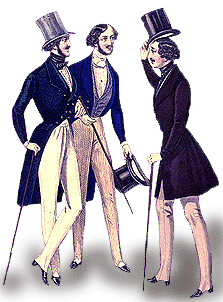
Victorian Gentleman
The concept of the nineteenth-century Gentleman is a complex one, though it is one which is, as one recent critic has noted, "the necessary link in any analysis of mid-Victorian ways of thinking and behaving." The Victorians themselves were not certain what a gentleman was, of what his essential characteristics were, or of how long it took to become one. Why, then, were so many of them so anxious to be recognized as one?
Members of the British aristocracy were gentlemen by right of birth (although it was also emphasized, paradoxically enough, that birth alone could not make a man a gentleman), while the new industrial and mercantile elites, in the face of opposition from the aristocracy, inevitably attempted to have themselves designated as gentlemen as a natural consequence of their growing wealth and influence. Other Victorians — clergy belonging to the Church of England, army officers, members of Parliament — were recognized as gentlemen by virtue of their occupations, while members of numerous other eminently respectable professions — engineers, for example — were not.
The concept of the gentleman was not merely a social or class designation. There was also a moral component inherent in the concept which made it a difficult and an ambiguous thing for the Victorians themselves to attempt to define, though there were innumerable attempts, many of them predicated upon the revival in the nineteenth century of a chivalric moral code derived from the feudal past. Sir Walter Scott defined this concept of the gentleman repeatedly in his enormously influential Waverley Novels, and the code of the gentleman — and abuses of it — appear repeatedly in Victorian fiction. "The essense of a gentleman," John Ruskin would write, "is what the word says, that he comes from a pure gens, or is perfectly bred. After that, gentleness and sympathy, or kind dispositionand fine imagination." Ruskin also maintained that "Gentlemen have to learn that it is no part of their duty of privilege to live on other people's toil," but many "gentlemen" did precisely that. Most of our authors have been gentlemen. How does the work of those who were not — Blake, for example, or Thomson — differ from the work of those who were? How could someone like William Morris be both a gentleman and a Marxist? In what ways is the notion of the gentleman implicit in much of the literature that we have read, and when, historically, does the term begin to lose its meaning?
Charles Dickens, like Kipling, was an author of relatively humble origins who desired passionately to be recognized as a gentleman, and insisted, in consequence, upon the essential dignity of his occupation. Great Expectations, which contains a great deal of disguised self-analysis, is at once a portrait or a definition of Dickens's concept of the Gentleman and a justification of his own claim to that title. Thackeray , on the other hand, insisted (and the two old friends quarreled over this matter) that a writer of novels could not be a gentleman. The debate over just what constituted a gentleman raged on in many contexts, but nowhere was it contested so fiercely as within Victorian literature itself, appearing in works as different as Tennyson's In Memoriam and the novels of Dickens and Thackeray.
Source: http://www.victorianweb.org
Javier Velasquez
The Qualities of a Gentleman
He acts kindly from the impulse of his kind heart.
He is brave, because, with a conscience void of offence, he has nothing to fear.
He is never embarrassed, for he respects himself and is profoundly conscious of right intentions.
He keeps his honor unstained, and to retain the good opinion of others he neglects no civility.
He respects even the prejudices of men whom he believes are honest.
He opposes without bitterness and yields without admitting defeat.
He is never arrogant, never weak.
He bears himself with dignity, but never haughtily.
Too wise to despise trifles, he is too noble to be mastered by them.
To superiors he is respectful without servility; to equals courteous; to inferiors’ kind.
He carries himself with grace in all places, is easy but never familiar, genteel without affection.
He unites gentleness of manner with firmness of mind.
He commands with mild authority, and asks favors with grace and assurance.
Jose Tomas Leyton